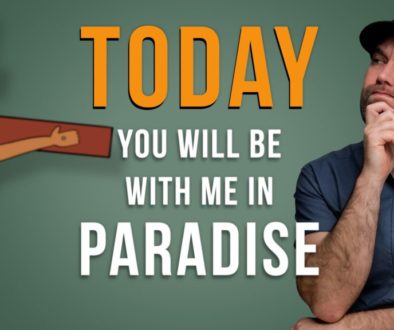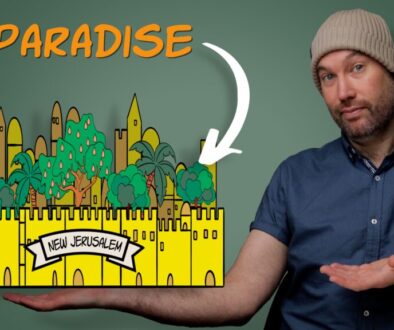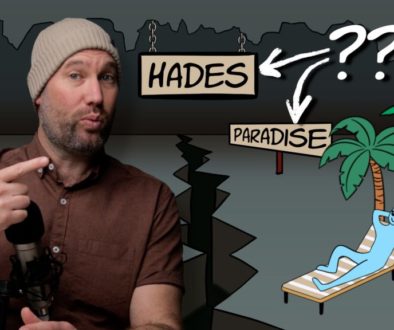Is It Time To Ditch “The Fall”?
Helpful? Not Always
Chapters and verses are not part of the original scriptures that make up the Bible. They were added much later to help make it easier for us to find and reference parts in a very, very large collection of writings. Not all translations have these, but most modern ones do. For better and worse, having the Bible divided into chapter and verse has shaped how we view and use the scriptures.
Along with chapters and verses there’s something else that isn’t original to the scriptures, but added much later to many of our translations. I’m talking about the little headings that frequently appear to tell us what each passage is about.
I often find these really helpful. Like if I want to find, for example, the “parable of the sower” but don’t know the exact reference, I can just flick through the Gospels looking at the little headings and find it pretty quickly.
But there’s a downside to these little headings. While giving us a hint about what is coming up in a particular passage they also affect how we interpret that passage. They automatically form a lens for us to read with, a lens that was added by someone other than the original author. And there’s one little heading in a lot of our Bibles that I take particular issue with.
To Fall Or Not To Fall
Genesis 3 in many translations starts with the heading The Fall, or The Fall Of Man. This concept of “The Fall” is also one of the 4 main acts in the Common Story of Creation, Fall, Redemption and Restoration. And I have some pretty big issues with it.
If you read, for example, the passages in Matthew, Mark or Luke that are given the heading “The Parable Of The Sower” you will read in the text itself that Jesus is telling a parable and it is about a farmer who “went out to sow his seed.” This heading has been added superficially to the Bible, but it lines up pretty well with the actual content. So no problem.
If you read Genesis 3 you will not find any mention of a “fall” of any kind. In fact, you will not be able to find mention of “the fall” or anything similar in the whole Bible!
“Wait, so this concept of ‘The Fall’, one of the key ideas in the story we tell of Christianity, is not even in the Bible??”
Correct.
Neither is it a concept in Judaism.
Here’s where someone might say, “Ok, so technically the specific term ‘The Fall’ doesn’t appear anywhere in the Bible, but it is a term that accurately describes what is happening in the story. We’re just arguing about words here.”
I strongly disagree. Words matter. And in this case this one word has a profound effect on the way we approach the whole Christian story.
We’ve already established that the term “The Fall” (or anything similar) doesn’t appear anywhere in the Bible. I’ve done a bit of a search for where the term actually originated and so far I can’t find it. But one thing is sure, it’s a term that was adopted well after the scriptures were written. And for some reason we’ve adopted it’s use wholesale and without question.
Up Or Down, On Or Off
So how does using the term “The Fall” affect how we interpret the biblical story?
When you think of a fall what do you picture in your mind? Maybe someone tripping over? One moment they’re upright, the next they’re flat on the ground. Or maybe you picture someone falling from a high place, like off of a cliff or a tall building. One moment they’re at the top, a few seconds later they’re at the bottom.
It creates a completely binary picture. Binary means there are only two options. A good example of something binary is a light switch. It’s either off or it’s on.
Reading Genesis 3 through the lens of a “fall” creates a binary picture where humans were up, then they were down. They were up on top of the cliff, they fell, then they were at the bottom. They were without sin, then they were sinful. They had relationship with God, then they were separated from God.
Aside from the fact that this “fall” paradigm isn’t true to the Story depicted in the Bible (which I’ll get to in a moment), it creates some big issues for the rest of the story.
If you treat the problem as binary, you treat the solution in the same way.
The Common Story says that humans weren’t sinful, then they were. As a consequence, they’d had relationship with God and then they didn’t. Solution? Jesus dies for sin, sin is gone and relationship is restored.
Binary.
What’s The Problem Here?
If we actually read Genesis without the “Fall” filter superimposed over the top we can see a much more dynamic picture than the Common Story presents. As I mentioned in a previous post, most stories have a basic plot structure: Setting ➝ Problem/Conflict ➝ Solution ➝ Conclusion. One of the issues with the Common Story and the “Fall” paradigm is that they pretty much stop at Genesis chapter 3 for the Problem/Conflict part of the story. Humans disobeyed God, sin and death entered the world, relationship with God was broken. Cool, got it, let’s move on to Jesus for the solution.
Actually, the Problem/Conflict part of the Story is established over several chapters in Genesis, all the way to chapter 11, and we miss many vital components by stopping at chapter 3. Chapter 4 in particular has a few things that create some major difficulties for the Common Story.
Attached to the “Fall” paradigm is also the doctrine of “original sin”, another idea that was developed later and not held by all streams of Christianity. “Original sin” is basically the idea that after Adam and Eve disobeyed God all humans from then on were subsequently sinful by nature, without any ability to change that nature. Our default is to just sin all the time. It is the idea that we are all “born in sin”.
Also inherent in the “Fall” and “original sin” ideas is separation from God. After the Fall humans have become sinful by nature, and (so it’s often claimed) since God can’t be in the presence of sin, humans are now separated from God.
Unfortunately, the very next part of the story doesn’t back up these ideas.
Cain And Abel
In Genesis chapter 4 we have the story of Cain and Abel. This story is often used to back up the “Fall” and “original sin” ideas. “See, straight away humans are sinful! Now they’re murdering each other!”
It’s true that sin is now in the world and it’s effects are devastating, resulting in murder. But it’s not true that wickedness is now the default mode of humanity. Nor is separation from God.
First of all, Cain and Abel are not separated from God. They’re exiled from the Garden of Eden, which is God’s home. The relationship between God and humanity has taken a hit, but it’s not totally broken. Cain and Abel both bring offerings to God, face to face. And he speaks with them, face to face. How is that separation?
In fact, Genesis 4:14 and Genesis 4:16 speak of Cain having to leave God’s presence as a consequence of his actions. There’s some pretty obvious questions here. How can you leave someone’s presence if you’re not in their presence to start with? And how can you be considered “separated” from someone if you’re in their presence and interacting with them?
Genesis 4 also contradicts the idea that sinfulness is now the default mode for humanity after the “Fall”. God literally tells Cain that he can choose to do what is right and doesn’t have to give in to sin:
Then the LORD said to Cain, “Why are you angry? Why is your face downcast? If you do what is right, will you not be accepted? But if you do not do what is right, sin is crouching at your door; it desires to have you, but you must rule over it.”
Genesis 4:6-7
Some would then argue that this story only serves to show that Cain actually couldn’t master sin, that it reveals the default sinfulness of humanity. There are two big problems with that argument. The first problem is that it’s reading ideas into the story that simply aren’t there.
The second problem is Abel.
Righteous Abel
The Common Story uses Abel only as a victim. His role in the story is to be murdered, showing that humanity is now utterly sinful. But in the story itself it says that, “The LORD looked with favour on Abel…” And, as I mentioned in a previous post, various New Testament references, including from Jesus himself, refer to Abel as being “righteous”:
“And so upon you will come all the righteous blood that has been shed on the earth, from the blood of righteous Abel to the blood of Zechariah…”
Matthew 23:35
By faith Abel brought God a better offering than Cain did. By faith he was commended as righteous, when God spoke well of his offerings. And by faith Abel still speaks, even though he is dead.
Hebrews 11:4
Do not be like Cain, who belonged to the evil one and murdered his brother. And why did he murder him? Because his own actions were evil and his brother’s were righteous.
1 John 3:12
So in Genesis 4 we see the very next humans that appear on the scene after the so-called “Fall”. One becomes evil, but the other is righteous. Sinful as a default? Apparently not. Separated from God? Don’t see that in the story either.
Do We Even Need Jesus Then?
So you may be feeling a bit uncomfortable looking at all this, and you might be wondering where it’s all heading. Am I going to advocate for self-salvation? That we don’t need Jesus? That his death was just a martyrdom, an example to us of non-violence and self sacrifice?
Not at all. Let me assure you that I believe Jesus is central to the Story and his death of vital importance. He is the one who saves us, we can’t save ourselves. And yes, sin is a massive problem.
But much of who Jesus is and how he saves us, even what salvation is, has been obscured by the Common Story. It can get pretty uncomfortable deconstructing what we’ve taken for granted for so long. But it’s necessary. And I believe the payoff will be huge. But there’s a lot more deconstructing/reconstructing to go, we’re just getting started.
So do I think it’s time we ditch the idea of the “Fall”? Yes. It’s not biblical, it’s not accurate and it’s not helpful. So what language should we use instead? That’s a good question, but maybe a bit premature to answer. The Problem/Conflict part of the Story is established all the way through to Genesis chapter 11, but we’ve only just looked at chapter 4.
Don’t worry though, I won’t spend a whole blog post on every chapter. Now that we’ve established that the “Fall” idea isn’t accurate we can move through the rest a bit quicker, and hopefully a more robust picture of what the Problem is in the Story will become a lot clearer.
As always, feel free to comment, ask questions or push back.



July 10, 2019 @ 3:27 pm
Interesting! That’s so different to what I’ve been taught and makes total sense. If you ever find where ‘the fall’ idea came from I’d be interested to know.
April 30, 2024 @ 8:27 am
👍👍